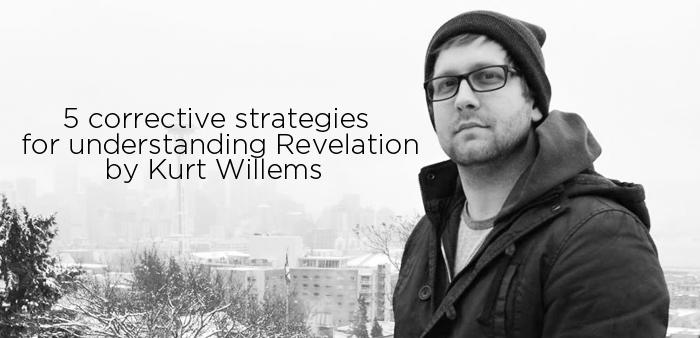Gotta Read These Guys
Most Sundays, I like to give a few shout-outs and share what I enjoyed from around the internet during the past week. Below are some posts from guys that ya gotta read…
This post, Lose The Christian Swag, by Carlos Whittaker. His blog is one of the top Christian blogs out there – and there’s a reason why so many people follow it… Carlos is raw, honest, fun, and always thought-provoking. Be sure to follow him on Twitter too!
This post, Into The Wilderness, by Nate Pyle. This was a guest post on A Deeper Story – but Nate also blogs regularly on his own website. Follow him on Twitter too!
This post, The Simplest Way To Change The World Today, by Sammy Adebiyi. Be sure to follow Sammy on Twitter.
And finally – this post, 5 Corrective Strategies For Understanding Revelation, by Seattle pastor Kurt Willems. Follow Kurt on Twitter! Below are the 5 strategies…
#1. Recognize that the central image in Revelation is the Lamb that was slaughtered. Christ is victorious by absorbing violence, not by inflicting it. His word (a sword) is more powerful than any weapons of the Empires of this age. God’s Christ defeats spiritual and physical evil through being executed by the empire and through such “Lamb Power” shares the victory with all Christ-followers.
#2. Remember that Revelation was first of all written by a first-century Christian for first-century Christians using first-century literary devices and images. Revelation first and foremost addresses a first century audience with the real pressures of conformity and idolatry specific to their situation. The letter to the churches was likely written in the time of Domition in the nineties CE and addresses ‘that’ situation more than ‘our’ situation. With that said, Revelation speaks to us because every age has to deal with the pressures of “Babylons” that rise and fall. Therefore, taking the unfamiliar language of Revelation as though it should be understood by our standards of wooden-literalness imposes our perspective on the text. Forgetting this fact is what leads to theological systems like the dispensationalism of “Left Behind.”
#3. Abandon so-called literal, linear approaches to the book of Revelation as if it were history written in advance, and use an interpretive strategy of analogy rather than correlation. Revelation is loaded with images and cartooning that were loaded with significance during the first century that may not have direct correlations to our day. Yet, we should note that this is a book that continues to warn us of the various forms of “Babylon” in our midst today and into the future. Gorman adds: “We should… be examining our ideologies and -isms for manifestations of idolatry and immorality as expressed in imperialism, militarism, nationalism, racism, classism (the worship of the corporate self and the degradation of the corporate other), consumerism, and hedonism (the worship of things and pleasure)… [W]e must especially examine our own Western, Northern, American, and even Christian systems and values, not some putative one-world government, for evidences of that which is antichrist.” Revelation doesn’t “predict” the future, but rather calls Christians to faithfulness in any age in which evil manifests itself.
#4. Focus on the book’s call to public worship and discipleship. This is to remember the invitation into patterns of community life that are non-conformist even if it leads to persecution or death. The hope of “a new heaven and a new earth” (Rev. 21) invites Christians to worship and follow Christ as advanced signs of a world flooded with the love and justice of God. Gorman states that “Revelation calls believers to nonretaliation and nonviolence, and not literal war of any sort, present or future. By its very nature as resistance, faithful nonconformity is not absolute withdrawal but rather critical engagement on very different terms from the status quo. This is all birthed and nurtured in worship.”
#5. Place the images of death and destruction in Revelation within the larger framework of hope. These dark images are “symbolic of the judgment and cleansing of God that is necessary for the realization of the hope offered in Christ for a new heaven and new earth in which God and the Lamb alone reign forever among a redeemed, reconciled humanity…” Judgement, then, is good news for the world!
HOW ABOUT YOU? What did you read or watch online this week that was worth sharing? Comment below.






OK, here’s a bonus one (and super funny if you happen to follow lots of Christian blogs)…
“Twenty-Five Bloggers In One Sentence” by Andrew Wilson http://thinktheology.co.uk/blog/article/twenty_five_bloggers_in_one_sentence_each
A few of my favorites:
Tullian Tchividjian: “Lucky for you, all those bits of the Bible that tell you what to do are actually about the fact that you can’t do anything.”
Desiring God: “Here’s why John Piper is right about everything.”
Tim Challies: “All the other guys you’re reading are probably false teachers.”
Rachel Held Evans: “You go, girlfriend.”
Tim Challies again: “Especially her.”
PS – many of the comments on this blog post are equally hilarious.